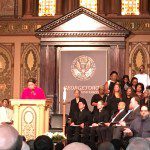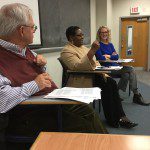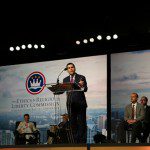(Note: I’m a freelance journalist who only dabbles in blogging. I don’t usually put a lot of personal stuff on the internet, but I thought this post might provide some helpful background on me as I begin writing at Patheos about the role of faith in the 2016 election. This first appeared on my personal blog in 2014.)

I think and write a lot about interdenominational Protestant and ecumenical Christian cooperation. I contend that these partnerships are, while often fragile, absolutely essential for the common good and for spiritual vitality. I am constantly reminded of how profoundly interdenominational, ecumenical, and interfaith institutions, initiatives, and experiences have affected my personal and professional life.
Though I did not realize it at the time, people and institutions outside my tradition influenced my upbringing in a United Methodist congregation. My Sunday school classes always raised money for the CROP Walk, a hunger relief project of the mainline Church World Service. Many older members lived in a large retirement community founded by the Evangelical Lutheran Church in America (ELCA). Dozens of members were trained in Stephen Ministry, a one-on-one lay caring ministry designed by an ELCA pastor. New Revised Standard Version pew Bibles, translated by an ecumenical committee of Bible scholars and published by the National Council of Churches, sat alongside the United Methodist Hymnals in our pews.
My pastors belonged to a local ministerial association that, among other things, created a soup kitchen that fed (and still feeds) hundreds of hungry people daily. A Lutheran pastor anchored the ministerial association for years. A Southern Baptist congregation provided the primary support for the soup kitchen.
Though the pastors of my youth were mostly-by-the-book Methodists, many trappings of 1990s-era evangelicalism were prominent in our church. A contingent of lay leaders attended a Willow Creek Association conference and returned with new ideas for ministry and outreach. Our church bus shuttled dozens of men to Promise Keepers rallies in nearby cities. Like many teens, I signed a True Love Waits pre-marital abstinence pledge, an initiative of the Southern Baptist Convention’s Lifeway Christian Resources.
A succession of excellent music directors, one of whom held a master’s from a Baptist seminary, kept the hymns, choral, and organ music fresh and varied. There were never many Latin chants, but there was frequently special music ranging from African-American spirituals to Southern gospel, contemporary Christian pop to high-church Anglican classics.
In my high school years, our youth ministry director, formerly a Quaker, drew from a wide spectrum of traditions for ministry ideas and emphases. Students listened to contemporary Christian music and attended concerts by evangelical artists. The profound spirituality and aesthetic beauty I encountered the music of Michael Card and Rich Mullins resonate with me to this day.
I owe whatever social conscience my upper-middle-class white suburban teenage self developed in those years to that youth ministry director, who was a devotee of center-left evangelical leaders. Participating in World Vision’s 30 Hour Famine was the closest thing I ever felt to hunger.
I followed my girlfriend (who I met attending a high school student leadership conference at an American Baptist college) to a conservative Southern Baptist college in Oklahoma. There, I immediately encountered how wide the gulf between Mainline and conservative Christianity can be. Nevertheless, a relatively diverse Protestant faculty taught a robust liberal arts curriculum. In my major area, religion, the professors were faithful, thoughtful Christian gentlemen – Southern Baptist pastor-theologians who study the Bible critically and nevertheless affirm its truths.
Not enamored of the literal-Bible fundamentalism that, in spite of the academic program at my Baptist university, seemed to permeate and undergird evangelical life in the area, I eventually began traveling 45 miles each way to attend Mayflower Congregational United Church of Christ in Oklahoma City. Mayflower’s senior minister, the Rev. Dr. Robin Meyers, was and is (with all due respect to my many clergy friends) the finest preacher I have ever heard.
As a master’s student at Boston University School of Theology, I studied alongside colleagues from all over American Protestantism, as well as from Korea, Africa, and elsewhere. The Boston Theological Institute afforded students the opportunity to cross-register for courses at area seminaries. One summer, I studied religion and science and Catholic social teaching at Boston College. I also took courses at Andover Newton Theological School, a joint United Church of Christ and American Baptist seminary. At BU, I studied most closely with a liberal Baptist sociologist and an evangelical historian from Northern Ireland. On graduation day, we received a baccalaureate address from a Greek Orthodox archbishop. I remember it well a decade later.
In my two-year stint as a parish minister in a United Methodist congregation (the same one from my childhood), I had a number of meaningful ecumenical and interfaith experiences. I completed a chaplain residency at a Seventh-Day Adventist hospital, where I visited and prayed with patients of diverse faith backgrounds (and tracked down a number of priests, rabbis, and imams when I was out of my league). I participated in a spiritual formation academy with clergy and laypeople from many denominations.
In a season of personal crisis, I received counseling from a Lutheran Church-Missouri Synod (LCMS) pastor-therapist with membership in the American Association of Pastoral Counselors, an organization dedicated to empowering clergy to practice legitimate counseling methods in their churches and communities.
Having abandoned a religious vocation, I began doctoral studies in political science at a Jesuit research university. My program is secular in nature, but I have greatly appreciated the experience of being on a Catholic campus. Only one of my professors was a priest (a first-rate scholar, teacher, and pastor). Yet I have had numerous significant ecumenical and interfaith experiences – too many to list. Perhaps the most meaningful has been the opportunity to assist a leading evangelical social and political activist with a course on faith, social justice, and public life at Georgetown’s Berkley Center for Religion, Peace & World Affairs (itself an exemplary ecumenical and interfaith initiative).
In addition to studying the political formation of clergy, my research agenda encompasses religious interest groups that seek to influence politics and public policy. Many of these organizations are funded through offering plate dollars. Others receive funds from secular ideological foundations. All of them enter strategic partnerships that cross sectarian and (less commonly) ideological lines to work toward common goals.
My professional life benefits from constructive arguments with Protestants of various stripes and from increasing sympathy and solidarity with Roman Catholics. Our Muslim friends and our children’s Jewish godparents richly bless me and my bride.
One of the greatest joys of my ecumenical life has been the friendship of clergy and lay people from all over the religious landscape. My careful observation of religion (and politics) in America has convinced me that interdenominational, ecumenical, and interfaith efforts are filled with untold promise and some peril. In general, narrow partnerships tend to be more partisan and ideological, while broad partnerships are more oriented to the common good. The broader the faith community’s consensus on any issue or policy, the harder it becomes for the rest of society’s institutions to ignore.
Look to cross sectarian lines whenever you can. Think about your ecumenical life. Where has interdenominational or interfaith engagement and cooperation surprised you? Moved you? Changed you? I invite you into your own reflection. For me, it has made all the difference.












